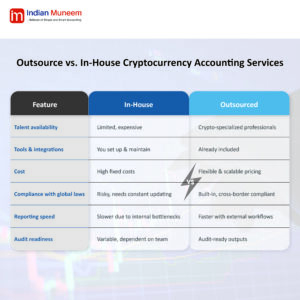More businesses today are holding or transacting in crypto, from startups using digital assets for payments to enterprises managing crypto investments across multiple wallets. With this shift, the need for accurate, compliant, and scalable cryptocurrency accounting services has become a serious priority.
Whether you’re managing a small crypto treasury or handling high-volume trades, one key decision often stands in the way: should you build an in-house team or outsource the accounting to specialists?
Why Crypto Accounting Is Nothing Like Traditional Accounting
Crypto assets don’t follow the same rules as cash or stock portfolios. Every transaction is a potential tax event. You might under-report income or overstate capital gains if you make one wrong classification.
Here’s what makes cryptocurrency accounting services uniquely tricky:
- 24/7 trading & real-time value fluctuations – Unlike traditional markets, there are no “end of the trading day” prices.
- On-chain data – Everything lives on blockchains, not in bank statements or standard ledgers.
- Thousands of tokens – From Bitcoin to obscure altcoins, valuation and classification vary.
- High-volume micro-transactions – Think staking, farming, or airdrops—accounting for each one is manual hell.
- Cross-border implications – Rules vary in NZ, Australia, Singapore, the U.S., Canada, the UK, and Europe.
Still thinking your in-house accountant or tax team can juggle all this?
The In-House Cryptocurrency Accounting Services
You might think, “Let’s just get our internal team to handle it.” That’s common, especially if you already have finance staff or a bookkeeper. But here’s where in-house crypto accounting gets tricky:
1. Crypto complexity is not standard accounting
If your team knows general accounting but hasn’t dealt with crypto on-chain data, DeFi protocols, or NFT royalties, they’re flying blind. Wallet addresses, gas fees, token classifications—none of these exist in traditional systems.
Even reconciliations become a nightmare. You no longer match a bank statement; you dig through block explorers and CSV exports from exchanges.
2. Tool overload + skill gaps
Let’s say you try to build a tech stack in-house. You might subscribe to different tools and resources. Now, these tools are helpful, but you still need someone skilled to operate them. Crypto tax and bookkeeping rules change constantly. Keeping your team upskilled is a cost not just in dollars but also in time and training cycles.
3. Audit season turns into a fire drill
The pain shows during year-end or audit prep. If your team wasn’t classifying things correctly—staking as capital income, wallets not linked to entities, or expenses recorded incorrectly—it’ll take weeks to fix. In some cases, you may not even have the correct records.
In short, in-house crypto accounting is doable but demands continuous upskilling, expensive software, and risk of non-compliance if you fall behind.
Outsourcing Cryptocurrency Accounting Services
Here’s what outsourcing changes for you: It’s not about replacing your finance team. It’s about adding crypto-native specialists who work with your team to keep things clean, compliant, and audit-ready.
Outsourcing Cryptocurrency Accounting Services doesn’t mean offloading mindlessly. It means partnering with people who already understand crypto accounting across jurisdictions, tokens, platforms, and tools.
Here’s where outsourced cryptocurrency accounting services win big:
1. You don’t need to figure out the tech or hire experts
An outsourced team brings its tech stack. From integrations with CoinTracker or Bitwave to custom-built import templates for DeFi wallets—they’ve already solved the challenges you’re discovering. You don’t have to start from scratch.
2. Global compliance? Already handled.
How crypto is taxed in Australia differs from how HMRC handles it in the UK or the IRS handles it in the US. With the OECD’s Crypto Asset Reporting Framework (CARF) rolling out, you can’t afford to get classification or disclosures wrong. Outsourcing partners who support clients across jurisdictions, bring that multi-country experience.
You don’t have to train someone on what your local authorities require. That knowledge is baked into their workflows.
3. You pay only for what you need
Most growing businesses don’t need a full-time crypto accountant. But they still need accurate books and tax-ready data. Outsourcing is flexible—you can scale up support during tax season and dial it back later. You’re not locked into a salaried role or expensive consultants. You get CPA-level service without CPA-level burn.
4. Real-time support with a global timing advantage
Especially if you’re based in the US, UK, or AUS, outsourcing to a time-zone-friendly partner means you get overnight turnarounds. For example, Indian Muneem operates with accounting professionals trained in international standards, offering support that blends local compliance with offshore efficiency.
They’re not just reconciling crypto wallets, they’re proactively advising on how to structure your crypto transactions for better financial outcomes. That’s value beyond bookkeeping.

So, What’s the Verdict?
If your business handles any form of crypto—whether trading, treasury management, or paying vendors—there’s no room for error.
Managing crypto accounting in-house might feel “cheaper” at first. But it often costs more between learning curves, compliance risks, tool complexity, and time drain. Outsourcing your cryptocurrency accounting services isn’t about giving up control. It’s about gaining clarity, staying compliant, and letting your team focus on growth.
At Indian Muneem, we simplify your crypto chaos.
We don’t just manage your tokens. We reconcile every wallet, classify every transaction, and ensure you’re fully compliant across jurisdictions, the New Zealand IRD, Australia’s ATO, or the IRS in the US.




